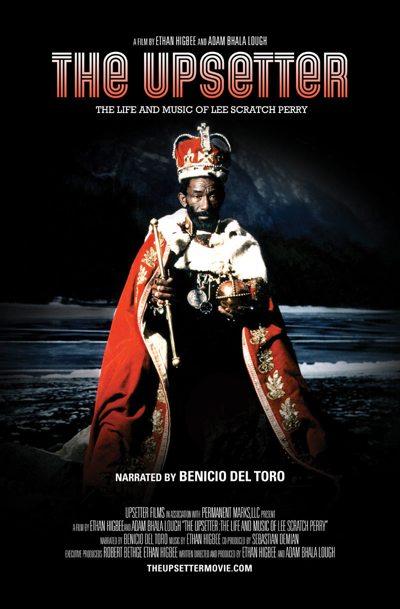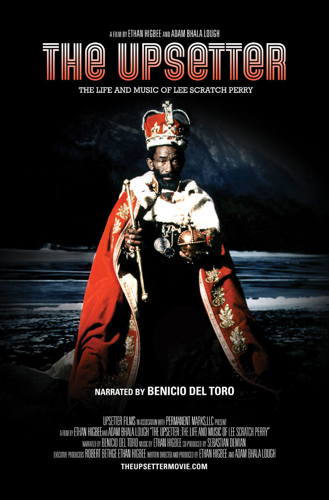THE UPSETTER
Ethan Higbee and Adam Bhala Lough's 2008 documentary about reggae vocalist/producer Lee "Scratch" Perry, narrated by Benicio del Toro, relies on one source for most of its material: a lengthy interview with Perry himself. Once a producer of hits for Bob Marley (who lived in his house in the early '70s) and The Clash, he's now living in Switzerland in his 70s and coasting on his past reputation, appearing in Guinness commercials (although he no longer drinks, smokes ganja or eats meat) and guesting on Beastie Boys songs. But in his prime, he was a pioneer without whom sampling might not exist — the film argues that his song "People Funny Boy" marked the first use of this technique — and his use of chanted vocals over remixed instrumental versions of his own productions paved the way for hip-hop. Most importantly, he invented dub, the reggae style that paved the way for much modern-day dance music.
Alas, the filmmakers never thought to talk to other reggae musicians who worked in a similar vein: They're content to let Perry ramble on about theology for minutes at a time, although his Rastafarian musings are far more interesting when backed by his eerie, reverb-laden music. Perry is at his most lucid discussing the downside of smoking too much ganja. But even as an old man, he tends to sound like a stoned college student, and Higbee and Lough indulge him rather than putting his music or "madman" persona in context. (Thursday, June 23 only, at The Belcourt) STEVE ERICKSON
MASTER HAROLD ... AND THE BOYS
Legendary South African playwright/novelist Athol Fugard's finest works adeptly chronicle the toll political injustice takes on both the oppressed and oppressors. The most recent film version of his 1982 play
Master Harold ... and the Boys makes its Music City debut Saturday as the latest entry in the International Black Film Festival of Nashville's summer series, and as on Broadway and in the previous film adaptation, its simple yet powerful story lays open the festering consequences of apartheid. Both a coming-of-age tale and an intense portrait of apartheid-era South Africa, the film spotlights the relationship between 17-year-old white Hally (Freddie Highmore) and black waiters Sam (Ving Rhames) and Willie (Patrick Mofokeng). They serve as surrogate parents and buffers to Hally, who endures a harsh, debiliating relationship with his abusive father. While his dad dispenses racist jokes and demeaning tasks, Sam and Willie provide positive role models to counter and contrast the emotional turmoil Hally experiences.
But while Sam and Willie treat Hally with respect and love, they realize the unspoken barrier of skin color always looms. Because Fugard wrote Master Harold in the early '80s, when apartheid's end was a distant goal, he didn't envision or structure the play as a utopian pipe dream. Thus the shattering climatic sequences, triggered by the return of Hally's dad, are no less shocking today than when Broadway audiences first witnessed them. Likewise, the cruel treatment Hally gives Sam and Willie remains powerful, even viewed in the light of South Africa's historic changes. These scenes reinforce the toxicity of bigotry, showing how it warps and perverts those who embrace it, no matter their reasons.
Superbly directed on a low budget by Lonny Price (who played Hally in the original Broadway run), Master Harold ... and the Boys packs a punch. Its principal characters' stoic posture and lack of overt defiance to a warped society may grate on more militant audience members. But its message — that those who allow evil to flourish are lost — is anything but meek. (5 p.m. Saturday at Bill and Carole Troutt Theater, 2100 Belmont Blvd.) RON WYNN
Online at nashvillescene.com: Craig D. Lindsey on Jackie Brown, showing midnight Friday and Saturday at The Belcourt.






